
The Hawaiian Potters Guild produced handmade glazed earthenware ceramics in Honolulu, Hawaii in the 1930s and 1940s.

The Hawaiian Potters Guild produced handmade glazed earthenware ceramics in Honolulu, Hawaii in the 1930s and 1940s.
In 1931, Sarah Wilder (Mrs. James A. Wilder), wife of the painter James Austin Wilder, began offering pottery courses at the Honolulu Museum of Art. These classes were expanded about 1937 by Mrs. Nancy Andrew. In 1935 Wilder and Andrew opened the Hawaiian Potters Guild on Upper Manoa Road. [1] The business was purchased by Hugh and Lita Gantt in 1939 [2] and later sold to the US Military in 1942. [3]
Its output was mostly functional and based upon plants found in Hawaii. [4] The guild also produced purely decorative pieces, such as the platter in shape of taro leaf with guava branch (illustrated), which was made for the luxury retailer S. & G. Gump and Company. [5]
The Hawaiian Potters Guild should not be confused with the Hawaii Potters' Guild, which was founded in 1967 and continues today. [6]

The Bernice Pauahi Bishop Museum, designated the Hawaiʻi State Museum of Natural and Cultural History, is a museum of history and science in the historic Kalihi district of Honolulu on the Hawaiian island of Oʻahu. Founded in 1889, it is the largest museum in Hawaiʻi and has the world's largest collection of Polynesian cultural artifacts and natural history specimens. Besides the comprehensive exhibits of Hawaiian cultural material, the museum's total holding of natural history specimens exceeds 24 million, of which the entomological collection alone represents more than 13.5 million specimens. The Index Herbariorum code assigned to Herbarium Pacificum of this museum is BISH and this abbreviation is used when citing housed herbarium specimens.
The Honolulu Star-Bulletin was a daily newspaper based in Honolulu, Hawaii, United States. At the time publication ceased on June 6, 2010, it was the second largest daily newspaper in the state of Hawaiʻi.
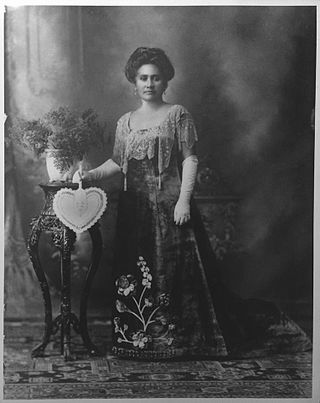
Theresa Owana Kaʻōhelelani Laʻanui was a descendant of Kalokuokamaile, the eldest brother of Kamehameha I. She was a member of the House of Laʻanui, a collateral branch of the House of Kamehameha.
Donald Benson Blanding was an American poet, sometimes described as the "poet laureate of Hawaii." He was also a journalist, cartoonist, author and speaker.
Toshiko Takaezu was an American ceramic artist, painter, sculptor, and educator whose oeuvre spanned a wide range of mediums, including ceramics, weavings, bronzes, and paintings. She is noted for her pioneering work in ceramics and has played an important role in the international revival of interest in the ceramic arts. Takaezu was known for her rounded, closed ceramic forms which broke from traditions of clay as a medium for functional objects. Instead she explored clay's potential for aesthetic expression, taking on Abstract Expressionist concepts in a manner that places her work in the realm of postwar abstractionism. She is of Japanese descent and from Pepeeko, Hawaii.

David Howard Hitchcock was an American painter of the Volcano School, known for his depictions of Hawaii.

Madge Tennent was a naturalized American artist, born in England, raised in South Africa, and trained in France. She ranks among the most accomplished and globally renowned artists ever to have lived and worked in Hawaiʻi.

Anna Rice Cooke was a patron of the arts and the founder of the Honolulu Museum of Art.
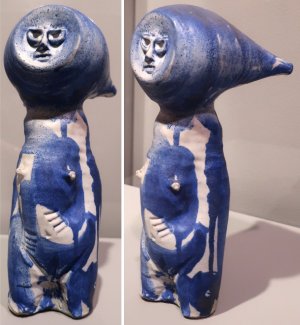
Claude Horan was an American ceramic and glass artist who was born in Long Beach, California. He received a BA from San Jose State University in 1942 and an MA degree in art from Ohio State University in 1946. His wife Suzi Pleyte Horan collaborated on many of the larger projects. He was a lifeguard and longboard surfer in Santa Cruz in the late 1930s, and is credited with naming Steamer Lane.

Samuel Pailthorpe King was an American lawyer and judge. He served as a United States district judge of the United States District Court for the District of Hawaii.
Aaron Padilla is an American artist and art educator.

Lahilahi Webb, was the last lady-in-waiting and companion of Queen Liliuokalani from 1914 to 1917 during the final years of the queen's life. She also worked as a guide and cultural ambassador for the Bernice Pauahi Bishop Museum.

Alatau Tamchiboulac Atkinson was a member of the House of Representatives for the Republic of Hawaii. He served as Superintendent of Public Instruction for the Territory of Hawaii following annexation to the United States. Appointed Inspector General of Schools for the Kingdom of Hawaii, he served under the administrations of Kalākaua and Liliʻuokalani, and continued in the position under the Provisional Government of Hawaii and the Republic of Hawaii. A journalist and newspaper owner, he is believed to have been one of two authors of satirical works lampooning Walter Murray Gibson's cabinet regime under Kalākaua. Atkinson Drive in the Ala Moana area of Honolulu, was named to honor him.

Mark Prever Robinson was a Hawaiian business magnate and politician. He served as Minister of Foreign Affairs of the Kingdom of Hawaii under the reign of Liliuokalani. During times of political upheaval and financial stress of Hawaii's changing governments, Robinson joined with other business men to come to the financial aid of the government.
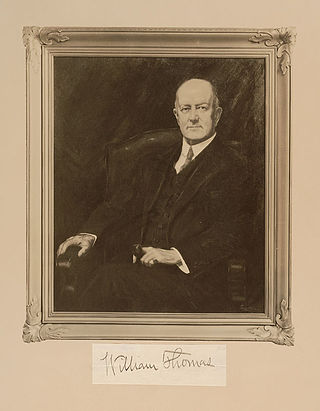
James Austin "Kimo" Wilder was an artist, writer, and scouting pioneer in Hawaii. Wilder was born on May 22, 1868, in Honolulu, Hawaii, the son of shipping magnate Samuel Gardner Wilder. He had five siblings.
The Hale Nauā was a secret society that had existed among Hawaii's ruling class before the 1778 arrival of Captain James Cook. Believed to have originally been an organization to unite the Hawaiian aristocracy, it gradually disappeared as the influx of outside cultures changed the dynamics of the island kingdom. Kalākaua revived the Hale Nauā, purposed with educating and developing knowledge of modern sciences, art, and literature among native Hawaiians. His incarnation of the society ended with his 1891 death. In the 1970s, Rocky Jensen and other artists formed Hale Nauā III to promote Hawaii's culture through the creative arts.

James Washington Lonoikauoalii McGuire was a royal courtier of the Hawaiian Kingdom. He served as a personal attendant and dressmaker to Queen Kapiʻolani, wife of King Kalākaua. McGuire fashioned the peacock feathered dress worn by Queen Kapiolani on the occasion of the Golden Jubilee of Queen Victoria in 1887. He kept a diary of his trip to the jubilee celebrations with the queen and published his account in 1938.
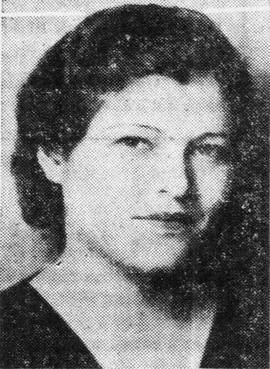
Thelma Alice Kalaokona Moore Akana Harrison was an American public health nurse and politician who served as a Republican Senator for Oahu in the Hawaii Territorial Legislature. She was the first woman to be reelected to the Territorial Senate.
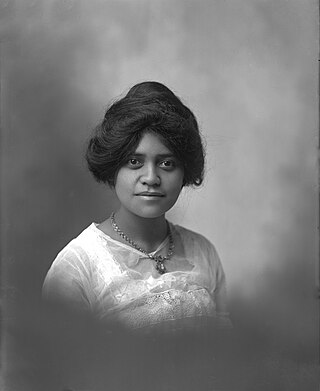
Flora Kekulalani Kaai Hayes was a Hawaiian-American politician and actor. She served in the Hawaii Territorial House of Representatives for seven terms between 1938 and 1959, representing Oahu as a member of the Hawaii Republican Party. From the 1920s through the early 1930s, Hayes became involved in various Hawaiian organizations. In 1936, she was elected president of the Territory of Hawaii's parent–teacher association (PTA), serving two terms. At the request of John Ford, she stopped in Hollywood while traveling back from a PTA conference in Virginia to play a minor role in the 1937 film The Hurricane.
Esther Kaleimomi Kaiuwailani Kaoao Richardson was a Republican Representative for Hawaii Island in the Hawaii Territorial House of Representatives. In the 1942 election, she was the only woman from Hawaii Island to be elected to public office. The Honolulu Star-Bulletin described her in 1951 as "a slender woman with quiet dignity". Richardson served in the Territorial House of Representatives representing the 2nd district for seven consecutive terms before her retirement in 1957. She was from South Kona, where she ran a lauhala weaving studio.